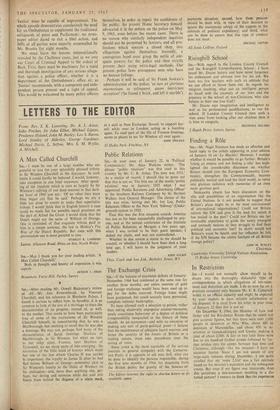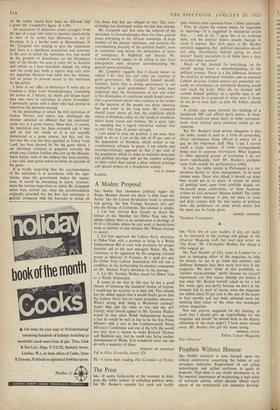In Restriction
SIR,-1 would not normally allow myself to be drawn into the thoroughly distasteful type of correspondence in which allegations of misstate- ment and distortion are made. I do so now (as on a previous occasion) only because Mr. E. R. Campbell writes in an official capacity and might be expected by your readers to have reliable information at his disposal. It is clear from his letter in your issue of January 22 that this is not so.
On December 8, 1964; the Minister of Law and Order told the Rhodesian House that he could not give accurate figures, but that there were over 1,000 people in detention at Wha Wha, about 480 in detention at Marandellas, and about 450 in re- striction at Gonakudzingwa and Gwelo, making a total of about 2,000. A day or two later there were five or six hundred' further arrests followed by fur- ther intakes into the camps between that time and Christmas, although—like the minister—I have no accurate figures. Since I am not aware of any large-scale releases during December, I am quite satisfied that my 'some 2,500' was a fair estimate based on the minister's statement and the subsequent events. But even if my figure was inaccurate, does this constitute a mis-statement resulting in a dis- torted picture? I venture to think that the impression on the reader would have been no different had I given Mr. Campbell's figure of 1,760.
An accusation of distortion comes strangely from the pen of a man who omits to mention (particularly in view of its name) that Malvernia is not in Rhodesia. It is a border town in Mozambique. If Mr. Campbell was seeking to give the impression that there is a significant population and economy in the area in which the restrictees live, this would be the grossest of distortions; on the Rhodesian side of the border the area is every bit as desolate and remote as I have described. Indeed, the siding near the camp was made a regular stop only after the Appellate Division had ruled that the minister had no power to prevent access to the restrictces by the public.
I have in my office in Bulawayo (I write this in London) a letter from Gonakudzingwa containing the names of, I believe, six chiefs and fifteen head- men who were in restriction in about November. I personally spoke with a chief who had arrived in restriction the previous evening.
In the proceedings in which the first restriction of loshua Nkomo and others was challenged the minister admitted on affidavit that the restrictees' camp was in a game reserve. Since then, of course, the restriction area has been extended and it may well be that the whole of it is not actually demarcated as a game reserve, but this, and the fact that the area has been gazetted as Tribal Trust Land, has been ignored by the big game which, I am informed, continue to populate virtually the whole area. Certain families who live on the Mozam- pique border west of the railway line have recently, I was told, been given notice to move on account of the game.
It is hardly surprising that the accommodation of the restrictees is in accordance with the regu- lations, since the government makes the regula- tions. It would be interesting to know, however, when the various inspections to which Mr. Campbell refers were carried out, since the accommodation originally provided for the first few restrictees is palatial compared with the barracks in which all
but those first few are obliged to live. The over- crowding has developed within the last few months.
Mr. Campbell says that since the removal of the restrictees to Gonakudzingwa there has been general peace prevailing in the African townships. A large number of the present restrictees, and certainly the overwhelming majority of the political leaders, were in restriction long before the declaration of states of emergency in Highfield and Harare. Mr. Campbell would appear to be telling us that these emergencies were declared notwithstanding the general peace prevailing.
Mr. Campbell suggests that I should know—as indeed 1 do—that law and order are essential to good government. Mr. Campbell himself should, however, know that a strong government is not necessarily a good government: that even more important than the maintenance of law and order is the elimination of conditions which breed unrest: that a government which rules contrary to the wishes of the majority of the people can never maintain law and order in the long term. Mr. Campbell should know above all that the conditions which obtain in Rhodesia today are the standard conditions which breed unrest and violence. He is quite right in assuming that 1 regard restriction without trial as evil. This type of power corrupts.
I am asked to state my position. 1 am more than ready to do so. I am on the side of 95 per cent of the population of Rhodesia which wishes to see constitutional advance in peace. I am utterly and uncompromisingly opposed to that 5 per cent of the population which in order to maintain economic and political privilege will see the country collapse in ruins rather than accept a place without privilege and special powers in a prosperous society.
London
LEO S. BARON



































 Previous page
Previous page